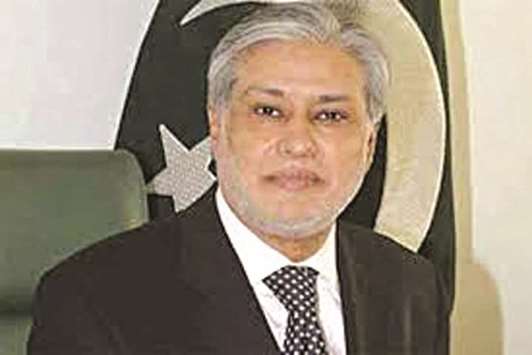Finance Minister Ishaq Dar’s fifth hearing in the accountability court ended yesterday without much progress as Dar’s lawyer was only able to complete Tariq Javed’s cross-examination.
In the previous hearing, Al-Baraka Bank Senior Vice-President Tariq Javed had informed the court that Dar opened an account in the bank’s Lahore branch in 1991 and provided the court details of all five accounts held by Dar in the bank.
Yesterday, he submitted a record of e-mails exchanged between the bank and the National Accountability Bureau (NAB), which he was asked to present by the court in last week’s hearing.
Javed said that he had not reviewed the submitted documents in detail and despite having submitted documents related to Dar’s First Hajvery Modarba Company, he was unaware of how modarba companies operated.
NAB’s Special Prosecutor Imran Shafiq said that a bank officer need not know how a company works and it was the job of the Securities and Exchange Commission of Pakistan (SECP) to inform on the matter.
Shafiq objected to Dar’s lawyer Khawaja Harris’ plea to exempt his client from appearing in the court for today’s hearing.
He said that the case was the most important matter for the accused and if an assignment or a meeting is a hindrance to his appearance, the accused should give it up.
Accountability Judge Mohamed Bashir deferred judgement on the matter which meant Dar remained in the court until the end of the day’s hearing.
The hearing was then adjourned until October 18.
Prosecution’s fourth witness, Masood Ghani, the manager of Habib Bank Islamabad, could not be presented yesterday because of lack of time.
Earlier yesterday, the court had postponed Dar’s hearing until 12pm after his lawyer Khawaja Harris failed to appear in court due to some prior commitments.
As the finance minister appeared in court, the bench had rejected junior lawyer Kauseen Faisal Mufti’s application for the defendant’s exemption from future hearings.
In the application, Mufti said that Dar wished to be exempted from court in order to be able to concentrate on his duties as the country’s finance minister.
The accountability court had indicted Dar last month in a reference pertaining to his owning “assets beyond his known sources of income”.
During an eight-hour trial, held on October 12, NAB had presented Tariq Javed and Shahid Aziz of the National Investment Trust (NIT) who testified against the finance minister.
Dar’s counsel continued to point out discrepancies in the prosecution’s evidence and, during the cross-examination of a prosecution witness, found certain documents to have been tampered with.
During the cross examination, defence counsel Khawaja Haris had drawn the court’s attention to an original document regarding Dar’s investments which was produced by the witness, saying that it was different from the copy submitted to the court.
It had emerged that the form carried stamps of two cities — Lahore and Islamabad — and seemed to have been tampered with.
When confronted with this detail, the witness had said that while NIT kept the original form, a carbon copy was sent to Karachi, adding that the photocopy that was submitted to the court was sent to him by the Karachi office.
However, the court had noted that the original and photocopy were different.
In his statement, the witness had informed the court that after receiving the original, as well as photocopies of the documents from Karachi, he sent the same to the Lahore NAB.
“If a carbon copy is made from the original document, then why is the photocopy different from the original?” asked Khawaja Haris.
The witness, however, said it was routine practice to make corrections in such documents.
The witness had told the court that Dar invested Rs120mn in NIT, but withdrew the amount in January 2017.
During cross-examination, the witness had confirmed that the investment was made in accordance with the company’s rules and the amount was refunded to Dar, along with the profit, after deducting government taxes.

Ishaq Dar
